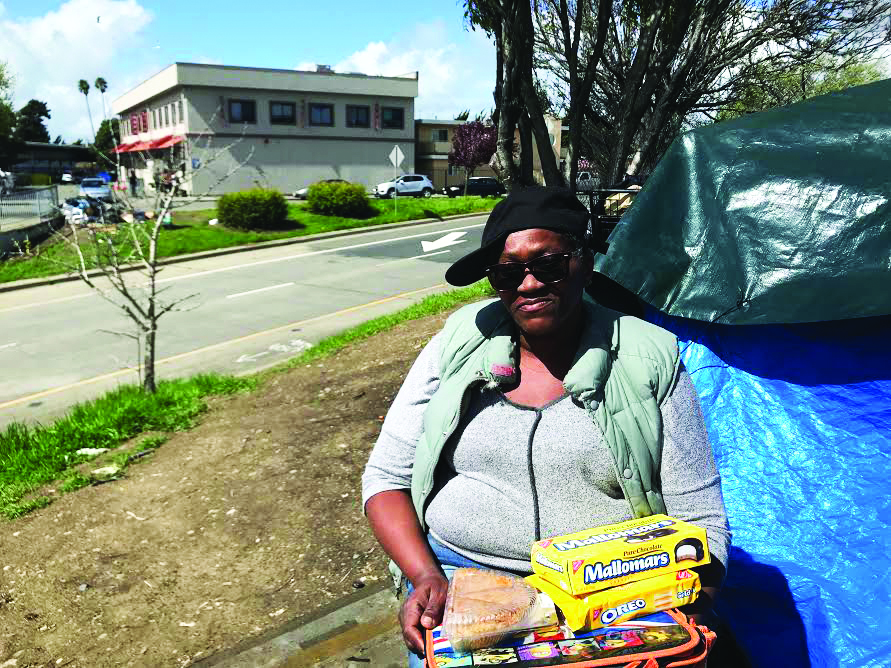

The first time I meet Cella Jones, she popped her head out of her tent at the 22nd Street Richmond encampment, the largest camp in Richmond. The camp, where about 60 people live, has been ‘posted’ for two weeks later, which means the residents have been scheduled to be evicted soon, and all their belongings will be cleared away. When we started talking, Cella (pronounced “See-ella”) told me that she has tried to leave the camp repeatedly. The rats bite through her tent and she rarely feels safe, but she has nowhere to go, no family to stay with. Her parents and uncle who once lived in the area have passed away, leaving no relatives left to help her get back on her feet. “No one lives here if they have another option.
That’s just the truth,” she said. Cella, who is 56, grew up in poverty. When she was young, her parents picked cotton in Texas and then moved to Corona, Southern California, to pick fruit. When Cella was six years old they moved up to Richmond to stay with family. Cella liked school—she graduated high school in Richmond and also attended some college classes before be- ginning a program to join law enforcement. She got stuck when she couldn’t finish the last class in the program, and couldn’t afford to continue.
Over time, her parents and extended family have died or moved away. Although she has moments of comfort now, she still feels paralyzed: without a family, license, a car, or money.
The camp where she now lives is spread out into three parts: the biggest portion is next to the road where a shelter is located. Pedestrians walk by regularly. A smaller portion, where about 10 people live, is a relatively thin median across from a two lane highway, and is flanked by another highway on the other side. The third portion isn’t visible from where we are, but Cella tells me it’s on the overpass near the Amtrack train tracks.
Cella left the camp last September when authorities cleared it out, but returned independently two days later because she couldn’t find alternative shelter. She has been camping since her car was impounded in 2014 and has been living at the site for nearly a year. Cella said it works well for her because it’s next to resources at the Greater Richmond Interfaith Program (GRIP).
“I’ve been here, close to the facilities, so I can maintain my health and self-worth,” said Jones, who goes to GRIP daily for food and to use the bathroom, the telephone and laundry facilities, and to collect mail.
Cella has tried to get into shelters, but they are often full and can be restrictive. Once the encampment is cleared, she will have nowhere to go.
“They don’t have enough shelters here,” she said of Richmond. “Wherever [city officials] are saying there are open shelter beds, there aren’t.”
Cella spends most days trying to reclaim possession of a house that’s been in her family for decades, owned by her uncle before he died. She says the local government unfairly seized the house and she’s been cut out of the process. Despite her efforts, all the paperwork and her lack of a computer is limiting. She says she’s close to giving up after years of trying.
“If you’re a black woman from the south you can’t have no property, no assets, nothing,” she said.
A few days after the camp was supposed to be cleared, Cella was still living there. The city decided to wait to evict the residents until mid-April, when a warming shelter is supposed to be opening up nearby. According to a city official, Richmond’s infrastructure division plans to place decorative boulders throughout the location where the camp is to discourage people from returning.
She is now across the busy road from where her tent was when we first met, packing up and relocating, trying to find a more isolated area. The night before was the last straw, she got no sleep because an unknown woman shot recklessly from a gun on the road near her tent, which scared her. She says it’s probably good for her to move to the more iso- lated island portion of the camp, since people come by and harass the folks where she’s currently set up, next to a pedestrian pathway. She plans to move next to Blue, another man who lives in the camp. They share food—Oreos and potato chips this afternoon, and chat about how they’re doing.
No one lives here if they have another option. That’s just the truth.
“I’m trying to survive. I’m not really hopeful. I’m not going anywhere. Everything’s stagnant,” she told him.
Still, Cella smiles a lot when we speak, and when she jokes with Blue. Her upper teeth are mostly gone, but she laughs it off. She repeats the old wives’ tale that you lose a tooth for every baby. She’s had five children and ten abortions. As she began losing teeth, she developed a lisp, but she’s now learned to speak without it.
Cella isn’t in touch with her children anymore. She wishes they would talk to her—knows they’re out on the street too, somewhere in the Bay Area— but doesn’t want to interfere with their lives.
Cella’s moments of contentment now come when she can relax in her tent in the evening and watch sci-fi and horror movies on the VCR she has set up. She loves the Resident Evil franchise and Dawn of the Dead: the action, the make-up, the special effects, the moments of humor.
During the day, she walks through the encampment and to the shelter with her stereo on her hip, listening to all the new pop and hip hop music that plays on the radio.
Street Spirits is a monthly column in which someone who lives on the street tells us their story.
Kate Wolffe is a reporter and weekend host at KQED.
